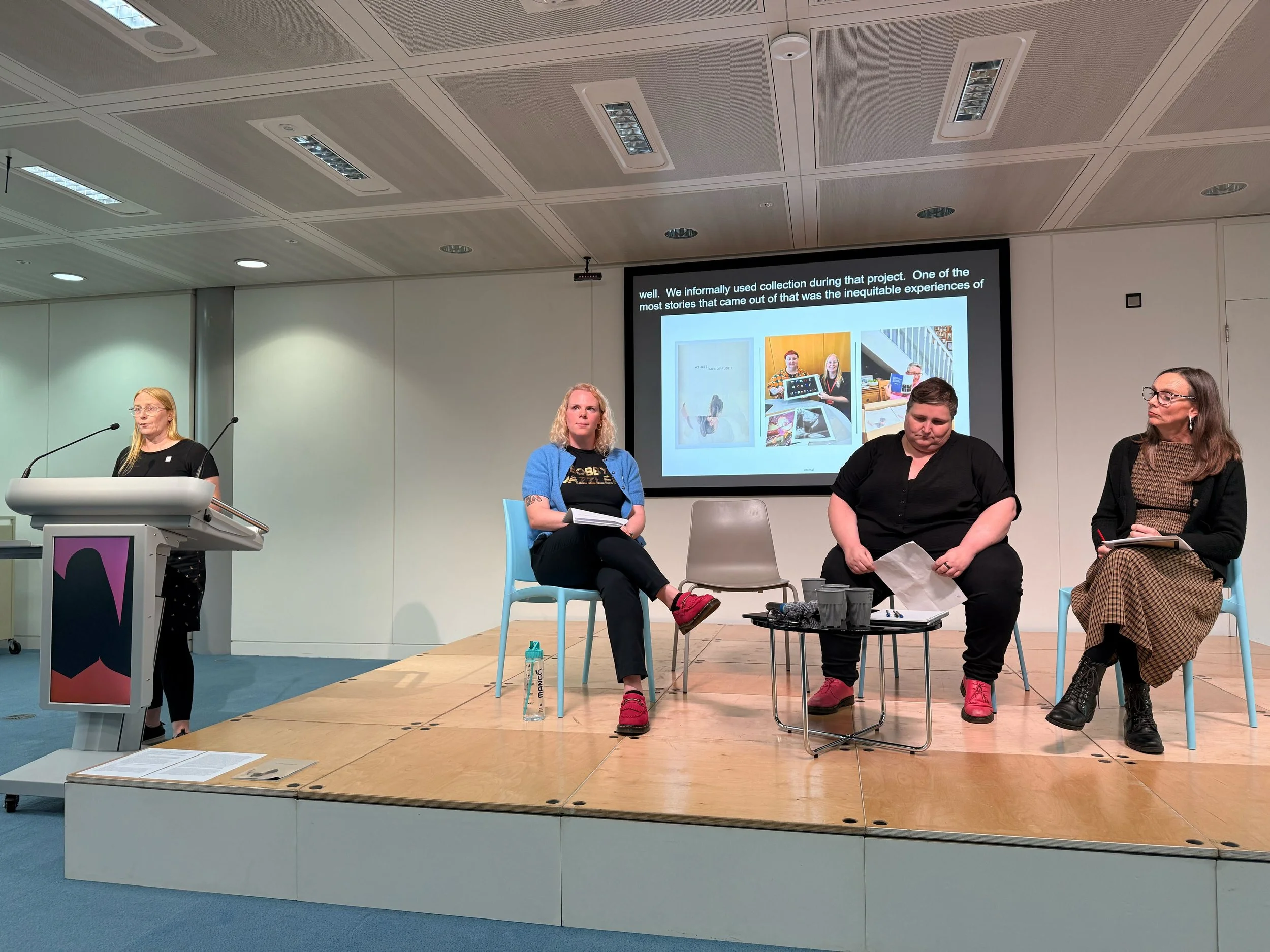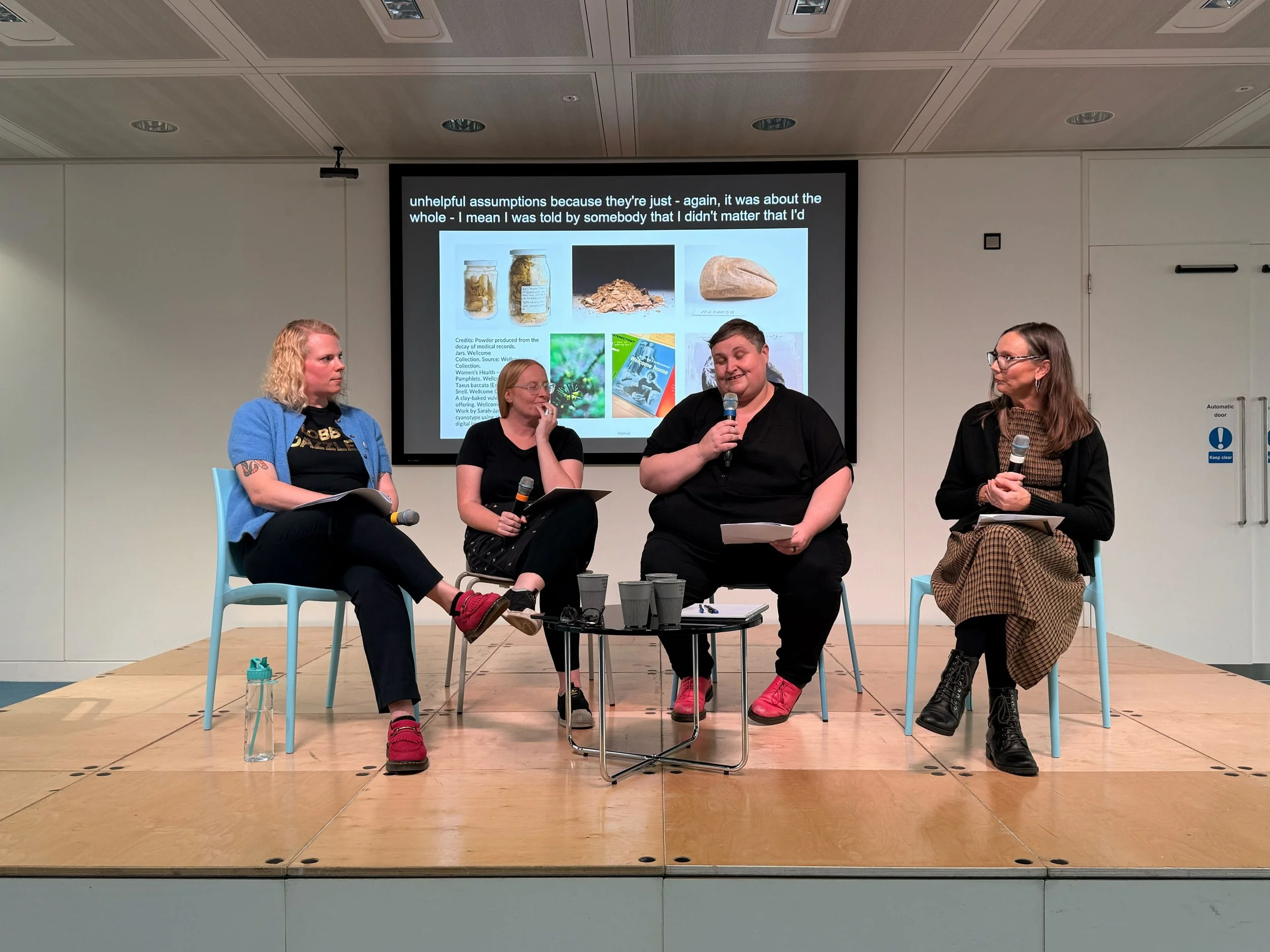marge and sarah-jane present at the mission in motion event
"Mission in Motion" is the name of the internal staff engagement initiative and speaker series at the Wellcome Trust, where internal and external speakers present different topics and projects they’re working on.
Me and Sarah-Jane from our gynae group were invited to give a talk at the October Mission in Motion event, alongside our Wellcome Collection colleagues Eris and Julia. This was a great opportunity to share the project with a wider audience at the Welcome Trust. It also coincided with us delivering my photographic portrait of Sarah-Jane to Mel, the Collections Manager: the Wellcome have acquired that work.
Eris opened the presentation with some housekeeping including a content warning. I introduced the project, and Sarah-Jane shared her story and reasons for being involved. This was then followed by a panel discussion and Q&A.
Although we were both fairly nervous sharing the project on behalf of the other group members, feedback from attendees was really positive, and it was great to share what we’ve been doing with a wider audience. 44 people responding to the post-event survey gave it an average rating of 4.9 out of 5. The feedback was collated into the below thematic areas:
Powerful and authentic voices – Attendees valued the honesty, vulnerability, and bravery of speakers sharing personal and lived experiences, which made the event deeply moving and relatable.
Focus on lived experience and equity – The emphasis on queer health, reproductive health, and intersectional issues (including medical queerphobia and fatphobia) resonated strongly and highlighted systemic inequalities.
Inclusive and engaging format – The event was praised for its openness, thoughtful structure, and balance between presentations and discussion, creating space for genuine dialogue and diverse perspectives.
Connection to Wellcome’s mission and collections – Participants appreciated how the conversation linked lived experience to Wellcome’s archives and broader mission, showing the potential for collections to drive equity and real-world impact.
Inspiration for action – Many attendees expressed a desire to see how different teams could respond to these insights and integrate them into work around equity.
Thanks to the Wellcome Trust for asking us to share the project with everyone.
Sarah-Jane has given me permission to share her story that she presented in her own words below.
With thanks to Andrew at the Wellcome for the below photographs.
------------------------------------------------
Sarah-Jane: Why did I agree to do it?
“It’s easier to tell you what I see when I look at it myself compared to what everyone else sees when they look at me.
I see me Sarah-Jane, fat, queer and most importantly still here when there were times in the last 5 years when I didn’t believe that was possible and feeling desperate enough that I felt it would’ve been easier if I wasn’t.
I see my happy place the wood that I would walk through as I was shielding during covid lockdowns in-between my cycles of chemotherapy, escaping and being mindful, surrounded by nature and listening to the river helped to ease the decline in my mental health after being diagnosed with an advanced ovarian cancer and womb cancer at the age of 42. Hearing the words too advanced to cure and should see four years when I had spent more than 2 years trying to get answers for my symptoms was devastating and hard to accept, I lost who I was and blamed myself for getting cancer.
I see someone who deserved to have the chance to hear that their cancer has been cured, whose unexplained weight loss was investigated instead of celebrated, who was suffering with every symptom of ovarian and womb cancer; the constant pain, changes to my bowel and bladder habits, vomiting, irregular bleeding, not being able to eat more than a few mouthfuls of food and struggling to breathe was according to the many Dr’s that I sat in front of “because I was fat and needed to lose weight… not the 4kg ovarian tumour and cancers that were being left to grow and advance inside me…
I see someone that has been told her whole life that her fat, queer body shouldn’t exist or be seen, that it isn’t worthy of love, compassion, respect and care even during cancer treatment the dehumanising words and fat shaming didn’t stop by the healthcare professionals that are supposed to be caring, on one occasion I was humiliated when being walked through for a scan, the healthcare professional walking in front of me announcing loudly to his colleagues that they had “big one” not my name or hospital number.
I see someone who’s scared physically and mentally, every day I look down and see the scar that starts at my boobs right down to my pubes, like a big zip keeping what’s left of me inside. After 8 hours of what they call ‘debulking’ surgery removing all visible signs of cancer, my tumour, ovary, womb, appendix, cervix, omentum, leaving me with 2 cm of my vagina without any warning, I still feel the impact that surgery has had on my body 5 years later, it wasn’t long before I realised that I was struggling with intimacy and pleasure more specifically that I’d lost the ability to orgasm, navigating sex and pleasure with a body changed by cancer, particularly gynae cancer is something that was never mentioned, they spent time talking about losing my hair but told me nothing about how surgery would change how I feel pleasure when they were operating directly on the organs and surrounding nerves that effect how we feel pleasure… most of the gynae nurses couldn’t even say the word vulva or vagina without being embarrassed, which only added to the silence, shame and stigma that’s associated with our gynae organs and cancer, but by not including those important conversations I was left feeling like it was just me that was experiencing this problem, it silenced me until I got the courage to ask to help. Even then the only information they had was heteronormative and about penetrative heterosexual sex, there was nothing about the intimate relationship we have with ourselves and our body’s, I was left struggling to accept that the parts of my body that are gave me pleasure and create life were limiting mine
I see someone that needs to work on their mental health daily, reliving trauma, dealing with the anxiety of the next 3-month check-up and scan... every pain that feels the same as before questioning if it’s my cancer starting to grow again, when all I want is a day that’s cancer free.
Why did I do it? I did it because I don’t want to hear another story like mine, to share with everyone like I do with future workforce of healthcare professionals, the reality of what it’s like to navigate gynaecological healthcare and cancer treatment, the missing conversations and the many barriers we have to overcome when your body and how you identity doesn’t fit in a box that the and rest of the world expects it to.
Reflections
Exploring the collection confirmed what I thought all along that shame, stigma and silence are all having an impact on our gynae health and always have done, that every conversation that’s had doesn’t feature a queer voice or perspective, it’s something I’ve noticed ever since I’ve been diagnosed, I would look for other cancer experiences that were LGBQT in the hope of finding someone that understands how it feels, whose experiences validate mine and has heard the same ‘unhelpful assumptions’ I like to call them.
In the leaflets given to people having hysterectomies being all about how we function as a housewife instead of a person; using examples like not lifting kettles of water or children, when we can start to resume the housework and when it’s safe to start having sex again with your husband after our surgeries, all very much like the ones I was given all these years later. Nothing to explain how it impacts our pleasure or how we feel about our body after this type of surgery…. just how quickly we can get back to servicing our husbands and families…
The gynae notes turning to dust in a jar is how I feel about the state of our gynae health, how we are left to suffer because of chronic underfunding and lack of research, gynae cancers are an afterthought, ovarian cancer has always been viewed as a cancer that only affects older women hence why the survival rate for ovarian cancer hasn’t changed since the 1970’s, on average it take 6 months to get a diagnosis and 40% of those are discovered in casualty with 75% of us being diagnosed at the most advanced stages 3&4, everyday 11 of us here in the UK will die from ovarian cancer.
The Vulva votive is empowering and symbolic for me, it’s a part of our bodies that we aren’t encouraged to look at or touch, from an early age we are told that it was wrong, we were never encouraged to use the word vulva. I was surprised this still existed in healthcare, whilst I was going through treatment the gynae nurses would use anything and everything else... between your legs or down there, it added to the shame I felt about having gynae cancers, how can we learn about our bodies, check for changes on our vulva if we aren’t using the right words for the parts of our bodies because it makes people feel uncomfortable.
It was assumed for the first 6 months of my treatment that I was married to a man; every letter or being called in the waiting room it was always ‘Mrs’ it took six months of me asking for them to change it on my records, that I wasn’t married and certainly not to a man but in that time before it was changed I was asked about how my husband felt about my surgery, a question they had never thought to asked me, whilst being told the results of the genetic test of my cancer I was told that I didn’t need to worry about passing a faulty gene on to my children, when I didn’t have any. It made me feel like I was invisible that they really didn’t care about me just how I fitted back into my gendered role. Even when I told them I was a lesbian I had a nurse that said it didn’t matter that I’d lost my womb and fertility by wrongly assuming that lesbians don’t want to have children because we don’t have sex with men.
I remember going for my cervical screening 20 years ago and being told I didn’t need to have the screening until I was older because I wasn’t having sex with men, so much misinformation leading to the risk of cervical cancers going undiagnosed in the LGBTQ community because of it.
I even questioned whether being gay had caused it, the conversations about reducing our risk of getting ovarian cancer, focuses on taking the contraceptive pill, having children and breastfeeding… I came out when I was 16, 32 years ago lesbian couples were not offered fertility treatment many aren’t even entitled to it now in 2025 and I’ve never needed to take oral contraceptives… I would ask myself “if I wasn’t a lesbian and I’d had children would I be living with ovarian cancer?” Our biggest risk is being born with ovaries, now the risk reducing surgery is to have our fallopian tubes removed as that where most ovarian cancers start. When gynaecological cancer charities talk about the 11 of us that die daily of ovarian cancer here in the UK, it’s always a picture of a heterosexual couple, they talk about husbands being left behind and the help that’s available but never partners, it makes you feel like you are invisible; that the people we love don’t matter.”



